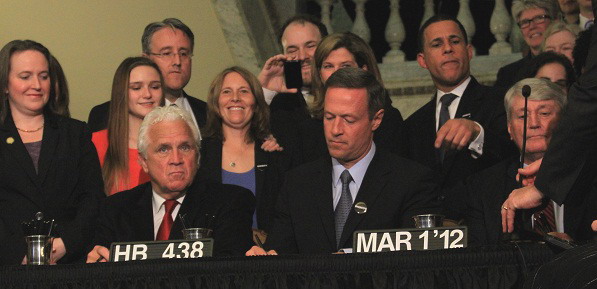Obama’s endorsement of same-sex marriage could impact Md. referendum
By Justin Snow
[email protected]
With a referendum on Maryland’s same-sex marriage law looming in November, President Barack Obama may have shaken the dynamic in the state on Wednesday as he openly endorsed same-sex marriage.
“At a certain point, I’ve just concluded that for me personally it is important for me to go ahead and affirm that I think same-sex couples should be able to get married,” Obama said in an interview with ABC News.
Obama’s definitive stance on the issue came three days after the White House was thrown into communications contortions when Vice President Joe Biden proclaimed his support for same-sex marriage during a Sunday TV interview. For more than two years, Obama had expressed support for civil unions, but said he was “evolving” on the issue of marriage.
Obama’s public stance on same-sex marriage may have implications for the 2012 presidential race, but it might have a bigger impact on the referendum process playing out in Maryland.

Senate President Mike Miller, Gov. Martin O'Malley and House Speaker Michael Busch sign same-sex marriage into law.
Supporters say momentum is on their side
Supporters of same-sex marriage were elated by the news, coming hours after North Carolina voters approved a constitutional amendment banning same-sex marriage. Gov. Martin O’Malley and dozens of other lawmakers took to Twitter to applaud the president after ABC News interrupted broadcasts at 3 p.m. to air Obama’s announcement.
“Today, President Obama affirmed that for a people of many different faiths — a people who are committed to the principle of religious freedom — the way forward is always to be found through greater respect for the equal rights and human dignity of all,” O’Malley said in a statement. “In Maryland, we agree.”
Carrie Evans, the executive director of Equality Maryland who played an integral role in passage of same-sex marriage legislation earlier this year, said the president’s evolution on the issue was similar to that experienced by legislators like Republican Dels. Wade Kach of Baltimore County and Bob Costa of Anne Arundel. They both voted in favor of same-sex marriage legislation in February.
“The drumbeat is there,” said Evans. “Week after week there are prominent public officials coming out supporting marriage equality. It really helps voters realize this is the right thing to do for families.”
Some gay rights advocates have expressed frustration at how long it took Obama to “evolve,” particularly after he already said he supported same-sex marriage in a questionnaire filled out in 1996. But Evans said it was time to embrace Obama’s statement rather than question his motives.
“People do things for all different reasons, as we saw in Annapolis this year,” Evans stated. “Politics is like that.”
Ramifications for Maryland
Same-sex marriage supporters point to Obama’s endorsement as a major boost for their cause. Yet it is unclear how this new dynamic will play out when Marylanders go to the polls in November with both the president and same-sex marriage likely on the same ballot.
Opponents of the Maryland law have collected about 30,000 of the more than 56,000 signatures they need to put same-sex marriage on the ballot. The Maryland Marriage Alliance reassured petitioners in a statement that Obama’s change in stance does not affect their efforts.
Much as he did in 2008, Obama will likely drive higher black voter turnout in November. However, substantial portions of the black community in areas such as Prince George’s County have long been religiously opposed to same-sex marriage.
Several polls have shown Marylanders fairly evenly divided on the issue. The question is whether higher black turnout will lead to same-sex marriage’s defeat or if Obama’s support will change minds on the issue in the months ahead.
According to Don Kettl, dean of the School of Public Policy at the University of Maryland, Obama’s support could galvanize opponents of same-sex marriage. While it is highly unlikely black Democrats will vote Republican because of Obama’s position, that does not mean they will vote for same-sex marriage in Maryland. Moreover, Democrats’ rocky relationship with conservative Catholic voters will likely be “exacerbated” by Obama’s shift, Kettl said.
Impact on young voters and the Democrats’ future
Another key demographic will be young voters who supported Obama in droves in 2008. Younger voters have been less enthusiastic about Obama this election, citing concern over the state of the economy. With that lack of enthusiasm plaguing Mitt Romney as well, young voters could be poised to stay home on election day.
People under 40 tend to support same-sex marriage more than older generations. But Kettl believes Obama’s support for same-sex marriage will not be a game changer so much as a larger wedge between the two parties.
“This could be part of a much broader trend that might really separate the two candidates on social and economic issues that younger voters care about and begin to convince younger voters that maybe they ought to show up and vote at the polls after all,” Kettl said.
Obama’s confirmed support for same-sex marriage will likely have political ramifications into the future as well. With 2016 presidential buzz already surrounding O’Malley and New York Gov. Andrew Cuomo, who have both successfully spearheaded same-sex marriage legislation, Kettl adds that this could be a “watershed moment” for the Democratic Party.
“It will be increasingly difficult for any major Democratic national figure to not back gay marriage,” Kettl said. “In all likelihood, nothing will be the same after this.”

MarylandReporter.com is a daily news website produced by journalists committed to making state government as open, transparent, accountable and responsive as possible – in deed, not just in promise. We believe the people who pay for this government are entitled to have their money spent in an efficient and effective way, and that they are entitled to keep as much of their hard-earned dollars as they possibly can.

